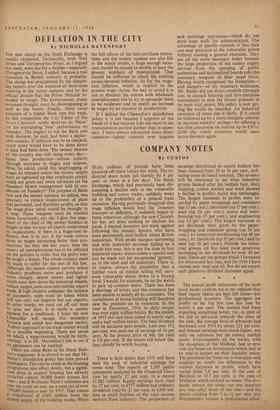COMPANY NOTES
By CUSTOS
MANY millions of pounds have been knocked off share values this weelc, The in- dustrial share index fell sharply by 4 per cent. or more in a few days. The Stock Exchange, which had previously been dis- counting a decline only in the vulnerable building and motor trades, suddenly woke up to the probability of a general trade recession. Having previously imagined that wage inflation would beat the Treasury attempts at deflation, it suddenly began to think otherwise, although the new Chancel- lor has yet done nothing to disclose his hand. I warned investors last week against following the Sunday tipsters who 'have been persistently over-bullish about British industrials. With profit margins narrowing and with industrial earnings falling as a whole this year, this is not the time to buy industrial equity shares unless a special case can be made out for exceptional 'growth,' as in the steel and oil industries. There is, of course, always the possibility that a further wave of market selling will carry even vulnerable shares down to a buying level. I would, for example, be on the watch to pick up LONDON BRICK. There has been a shortage of bricks and this company has been unable to satisfy all its customers. The curtailment of house building will therefore ease the pressure on its resources. In the year to December, 1954, its daily output was over eight million bricks. By the middle of 1955 this had been raised to nearly eight and a half million bricks. The final dividend will be declared next month. Last year 171 per cent. was paid out of earnings of 36 per cent. At the present price of 60s. the yield is 5.8 per cent. If the shares fall below 60s. they should be worth buying.
There is little doubt that 1955 will have seen the peak of industrial earnings for some time. The reports of 3,587 public companies analysed by the Financial Times rose by nearly 12 per cent. to a record £1,882 million. Equity earnings have risen by 27 per cent. to £577 million and ordinary dividends (net) by 21 per cent. to £208 mil- lion (a small fraction of the total income derived from industry). The proportion of earnings distributed to equity holders has been reduced from 38 to 36 per cent., indi- cating some dividend restraint. The investor will be interested to see what industrial groups looked after his welfare best. Only shipping, cotton textiles and wool showed a decline in profits; rayon was unchanged. The largest increases in profits were re- corded by paper wrappings and containers (up 35 per cent.), chemicals (up 27 per cent.), steel (up 26 per cent.), stores and ware- housing (up 15 per cent.), and engineering (up 13 per cent.). The largest increases in net dividends were given by the paper- wrapping and container group (up 56 per cent.), by stores and warehousing (up 40 per cent.), by chemicals (up 35 per cent.) and by steel (up 26 per cent.). Outside the indus- trial groups oil has been most generous, increasing its net dividends by over 40 per cent. These are the groups which I favoured for investment last year, and for 1956 1 have chosen only steel and oil. But do not expect such generous dividend increases again.
The annual profit statements of the joint stock banks confirm me in my opinion that their equity shares are best left alone—for professional investors. The aggregate net profits of the big five rose last year by nearly 6 per cent. The market had been expecting something better, for, in spite of the fall in advances towards the close of the year, the average level of advances had increased over 1954 by about 12+ per cent. and interest earnings were much higher, not. only on advances but on money market assets. Unfortunately all the banks, with the exception of the Midland, had to pro- vide for losses on investments which had to he sold to bolster up their liquidity ratios. The provision for losses on investments sold explains no doubt the differences in the various increases in profits, which have varied from 3.8 per cent. in the case of Barclays to 10.7 per cent. in the case of Midland. which realised no losses. The divi- dends remain the same—no one expected any rises after those of last year—and the shares yielding from 5 to 51 per cent. (for Westminster) remain a professional affair.


































 Previous page
Previous page